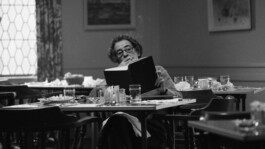



© DHM / Middletown, Conneticut, Wesleyan University Library, Special Collections & Archives
Hannah Arendt, born in 1906 in Hanover, is regarded as one of the most influential political thinkers of the twentieth century — a Jewish intellectual profoundly shaped by the upheavals and persecutions of her era. Her thought emerged from the catastrophes of the 20th century: National Socialism, antisemitism, war, and exile. She was not concerned with eternal truths, but with a form of thinking that confronts the pressing challenges of the present.
Arendt’s philosophy was inseparable from political experience. Her reflections sprang from the vantage point of refugees, the stateless, the Jewish outsider, the politically engaged actor, and a witness to both human greatness and human depths. She insisted that political events be neither reduced to mere moral judgments nor explained solely through historical analysis, but rather examined in all their complexity, contingency, and contradictions. Against the notion of a single, absolute truth, she proposed a conception of truth as inherently bound to time, perspective, and experience. A favorite Arendt quote from Franz Kafka captures this perfectly: „Es ist schwer, die Wahrheit zu sagen, denn es gibt zwar nur eine, aber sie ist lebendig und hat daher ein lebendig wechselndes Gesicht.“ (Kafka, Franz: Briefe an Milena, Frankfurt am Main 1986, Brief vom 23. Juni 1920)
After studying philosophy, theology, and classical philology under Martin Heidegger, Nicolai Hartmann, and Rudolf Bultmann in Marburg, and Edmund Husserl in Freiburg, she earned her doctorate with Karl Jaspers in Heidelberg. In the 1930s, Arendt fled the National Socialists, initially residing in France before emigrating to the United States in 1941. There, she became a leading voice among German-Jewish émigrés and later gained international recognition as a public intellectual. In her critical engagement with European political philosophy and theory, she intertwined these traditions with American ideals of political liberty, republican thought, and social pluralism — a synthesis that lent her work a distinct transatlantic perspective. Among her most notable writings are The Origins of Totalitarianism (1951/1955), The Human Condition (1958/1961, Between Past and Future. (1957/1961), Eichmann in Jerusalem: A Report on the Banality of Evil (1963/1964), and On Revolution (1963/1965).
Her thinking, marked by a philosophically grounded critique of social and political conditions, addressed themes that demand critical reflection: the fragility of freedom, the conditions for political action, and the perils posed by ideology and moral indifference. From early on, she wrote with engagement, critical insight, and independence on issues such as antisemitism, Jewish identity, and Zionism.
Although she taught at prestigious institutions including Princeton, the University of Chicago, and the New School for Social Research in New York, Arendt never followed a conventional academic career. She remained fiercely independent throughout her life, guided by the conviction that thinking itself is a political act and that judgment always presupposes a relation to others. She passed away in 1975 and was laid to rest at Bard College in New York alongside her husband, Heinrich Blücher.

Hannah Arendt, born in 1906 in Hanover, is regarded as one of the most influential political thinkers of the twentieth century — a Jewish intellectual profoundly shaped by the upheavals and persecutions of her era. Her thought emerged from the catastrophes of the 20th century: National Socialism, antisemitism, war, and exile. She was not concerned with eternal truths, but with a form of thinking that confronts the pressing challenges of the present.
Arendt’s philosophy was inseparable from political experience. Her reflections sprang from the vantage point of refugees, the stateless, the Jewish outsider, the politically engaged actor, and a witness to both human greatness and human depths. She insisted that political events be neither reduced to mere moral judgments nor explained solely through historical analysis, but rather examined in all their complexity, contingency, and contradictions. Against the notion of a single, absolute truth, she proposed a conception of truth as inherently bound to time, perspective, and experience. A favorite Arendt quote from Franz Kafka captures this perfectly: „Es ist schwer, die Wahrheit zu sagen, denn es gibt zwar nur eine, aber sie ist lebendig und hat daher ein lebendig wechselndes Gesicht.“ (Kafka, Franz: Briefe an Milena, Frankfurt am Main 1986, Brief vom 23. Juni 1920)
After studying philosophy, theology, and classical philology under Martin Heidegger, Nicolai Hartmann, and Rudolf Bultmann in Marburg, and Edmund Husserl in Freiburg, she earned her doctorate with Karl Jaspers in Heidelberg. In the 1930s, Arendt fled the National Socialists, initially residing in France before emigrating to the United States in 1941. There, she became a leading voice among German-Jewish émigrés and later gained international recognition as a public intellectual. In her critical engagement with European political philosophy and theory, she intertwined these traditions with American ideals of political liberty, republican thought, and social pluralism — a synthesis that lent her work a distinct transatlantic perspective. Among her most notable writings are The Origins of Totalitarianism (1951/1955), The Human Condition (1958/1961, Between Past and Future. (1957/1961), Eichmann in Jerusalem: A Report on the Banality of Evil (1963/1964), and On Revolution (1963/1965).
Her thinking, marked by a philosophically grounded critique of social and political conditions, addressed themes that demand critical reflection: the fragility of freedom, the conditions for political action, and the perils posed by ideology and moral indifference. From early on, she wrote with engagement, critical insight, and independence on issues such as antisemitism, Jewish identity, and Zionism.
Although she taught at prestigious institutions including Princeton, the University of Chicago, and the New School for Social Research in New York, Arendt never followed a conventional academic career. She remained fiercely independent throughout her life, guided by the conviction that thinking itself is a political act and that judgment always presupposes a relation to others. She passed away in 1975 and was laid to rest at Bard College in New York alongside her husband, Heinrich Blücher.
© Hannah Arendt-Verein für politisches Denken e.V.
© Hannah Arendt-Verein für politisches Denken e.V.
Impressum und Datenschutz